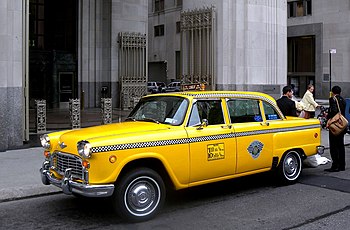Soundtrack in my head: They Might Be Giants, “Don’t Let’s Start”


How would you feel if a new company set up shop in your town and immediately proceeded to start breaking the city’s laws? And when threatened with enforcement of such laws declared that your laws were outdated and needed to be changed? Now imagine a company whose very business plan involved deliberately breaking such laws in city after city. Meet Lyft and Uber. They intend to enter in Madison’s taxicab market–but on their own terms, rather than the terms established by officials elected by the citizens of Madison.
Their first tactic was to deny that they were, in fact, taxicab businesses at all, but something different. They used techspeak such as “peer-to-peer,” “next generation” and “community-building.” Yet they also posted ads looking to hire drivers. Doesn’t sound very “peer-to-peer” to me.
Upon failing to convince people locally that they were anything but a taxi service, they turned around and claimed that the city’s regulations were hopelessly 20th century and needed to be updated or eliminated.
The question is why they deserve such special consideration. Is Uber finally providing the jetpacks we were promised would arrive in the 21st century? Does Lyft’s name indicate that their drivers are piloting hovercraft able to leap over a traffic jam in a single bound? No, it turns out that what makes them different is that they have a phone app.
A phone app? That is sooooo 2009. Furthermore, Madison-based Green Cab beat them to the punch by providing mobile-based services before Lyft and Uber came knocking. Union Cab sends text messages to passengers three minutes prior to arrival and, like Green Cab, offers online ordering and fare estimation. Unfortunately, that didn’t stop a couple of Madison newspaper pundits from taking the San Fransisco-based companies hook, line, and sinker and declaring that a “trendy” Madison deserved a “trendy” service like these San Francisco companies. Funny–I didn’t think that the former Madison mayor and the Wisconsin State Journal columnist were fashionistas.
One person unswayed by the hype was Madison’s current mayor Paul Soglin. He eloquently defended the city’s current regulations in his blog. He and other city officials insisted that they would enforce Madison’s laws regarding taxicab registration. Lyft and Uber insisted that they would continue to operate, Madison’s laws be damned.
Finally, the city of Madison made good on its word by conducting a sting operation. Undercover cops used the apps to order one ride each from Lyft and Uber. At the end of each ride, the drivers each charged the undercover cops somewhere in the neighborhood of $20 for the ride (oddly enough, it was as much or more than other taxi services in Madison). The cops in turn handed the drivers citations for over $1,000 each for operating cabs without licenses. Lyft immediately pledged to compensate the affected employees for the fines. I guess fines for breaking the law are considered a business expense.
You would think that this way of of doing business would make government officials wary of giving these companies any special consideration. Certainly Mayor Soglin has made it clear that Lyft and Uber need to get in line like the other cab companies have done and go through the appropriate permitting process. In some ways, I think even that is generous–if a company enters a city with the intention of breaking its laws, it would seem to me that city officials should give the companies a one-way bus ticket back to where the sun doesn’t shine. (Or San Francisco.)
Incredibly, some people think that such behavior merits not the boot, but red-carpet treatment from the city. Not surprisingly, one such person is an Assembly Republican who suggested cutting state aid to Madison for standing up to these bullies. But even more surprising are such claims from Madisonians who claim to love the city.
Madison Ald. Scott Resnick is actually introducing legislation to give these companies the right to do business in town largely on their own terms. One critical plum being offered Lyft and Uber is a waiver of the requirement that cab companies serve all areas of the city 24/7 rather than picking and choosing the plum times and the wealthiest customers.
The city has good reasons for requiring 24/7 operation. The buses don’t run 24/7 and don’t cover all parts of the city. What about third-shift employees or others who must get to or from work in the middle of the night? Outside of the bicycle (which the vast majority of Madisonians won’t use in cold winters or heavy downpours) the taxicab is the only way to go. Taxicab companies lose money on third shifts, and so the city decided that in order to ensure have an even playing field, it would require cab companies to run 24/7. This hasn’t served as a barrier to entry for new cab companies–indeed, Green Cab just opened up for business within the past decade.
I refer to Lyft and Uber as “invasive species,” because, by their very definition, they are not native to an area but end up disrupting an ecosystem and dominating it, to the detriment of other species living in the area. If Lyft and Uber are allowed to cherry-pick the best times and locations of the day, the companies who take on the losses for 24/7 operation will find it harder to maintain those operations. If these cab companies close down due to losing money, no one will be left to provide 24/7 service to all areas of the city. Result: net loss for Madison’s citizens, as they lose the ability to get from point A to point B whenever they need to.
What concerns me the most about Lyft and Uber’s business models is that this scofflaw mentality and insistence on special treatment regardless of the needs of the city could set a very dangerous precedent. If Lyft and Uber are allowed to operate on their own terms in Madison, what’s to stop other out-of-town companies from doing the same? What if a “food-sharing” company came in and had people run “restaurants” out of their own homes that violated health department regulations? What if an out-of-town construction company came in and started deliberately ignoring city laws that restrict construction activity between 7 p.m. and 7 a.m. What if someone decided to just go ahead and open a peaker coal plant next door to you without seeking permission because they thought that air quality regulations were silly. Laws exist to protect the rights and legitimate interests of citizens.
What Lyft and Uber represent is an ideology that has quietly (and sometimes not so quietly) established itself in many parts of the world. It is an ideology that essentially says that government regulations are inherently bad, regardless of the circumstances. And it is a means by which citizens lose more and more control over what happens in their communities, as out-of-town companies skirt accountability, act with impunity and operate with little regard for the quality of life in the communities where they set up shop.
If these companies continue to insist on “my way or the highway,” the City of Madison should do the sensible thing and show them the highway out of town. It’s not hard to find–simply take Interstate 39 south about 80 miles to Interstate 80, turn right and follow the road about 2,000 miles west–all the way back to San Fransisco where they came from. And once they reach the ocean they should keep on driving west.


